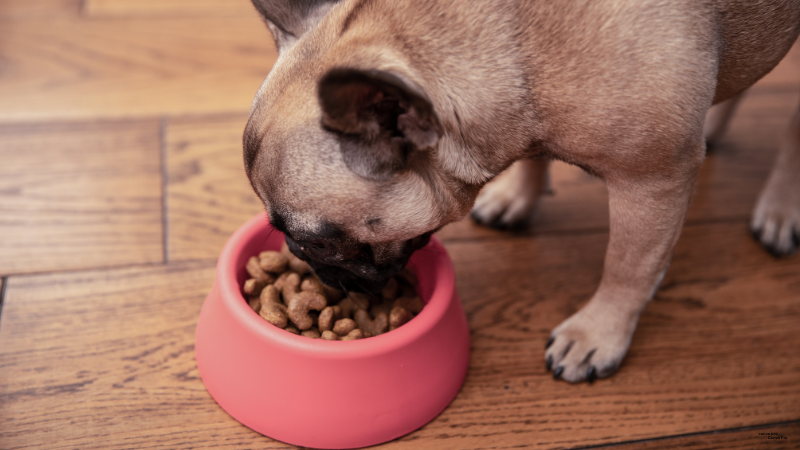Calorie Requirements for Pregnant Dog Diet
Pregnant dogs have unique nutritional requirements that change throughout their pregnancy stages. Their caloric needs increase substantially as the pregnancy advances. According to veterinary nutrition experts, pregnant dogs should consume approximately 30-60% additional calories by their final pregnancy stage. This increase in calorie intake should be implemented gradually, beginning around week five of pregnancy.
Here’s a helpful tip: Utilize a kitchen scale for food measurements. This ensures accurate portion control while adjusting your dog’s daily food intake.
Protein: The Building Blocks of Puppy Development
Protein is crucial for fetal growth and embryo development. According to AAFCO guidelines, a high-protein diet for pregnant dogs should contain a minimum of 22.5% protein on a dry matter basis. Quality protein sources from animals (including chicken, beef, or fish) should be the primary ingredients in your pregnant dog’s food.
Fats: Fueling Energy and Brain Health
Fats provide essential energy and support puppy brain development. Look for dog foods containing 8-20% fat content when feeding pregnant dogs. Omega-3 fatty acids, especially DHA, are crucial for cognitive development. Research indicates that DHA supplementation during pregnancy and nursing supports brain and vision development. Consider adding fish oil to your dog’s diet (with veterinary approval).

The Importance of Balanced Nutrition
While increased caloric intake is necessary, maintaining balanced nutrition remains essential. Excessive feeding can result in obesity and unhealthy weight gain, which may complicate delivery. Research published in the Journal of Nutrition demonstrates that overweight dogs typically have smaller litter sizes and face more challenges during labor.
For balanced nutrition, choose the best food for pregnant dogs, specifically formulated for all life stages, including pregnancy and lactation. These formulations address the complex nutritional requirements of pregnant dogs while avoiding nutrient imbalances often associated with homemade diets.
Tailoring Nutrition to Individual Needs
Each pregnant dog has individual requirements. Regular veterinary visits help monitor and adjust dietary needs throughout pregnancy. Proper nutrition during this period establishes the foundation for healthy puppies and uncomplicated delivery.
Let’s now delve into specific feeding strategies that will help you effectively implement these nutritional guidelines for your pregnant dog.
What Nutrients Do Pregnant Dogs Need Most?
A well-balanced pregnant dog diet is essential to support healthy puppy development and maintain maternal health. We’ve collaborated with veterinary nutrition specialists to bring you the latest information on crucial nutrients for expecting dog mothers.
Protein: The Foundation of Puppy Growth
Protein plays a vital role in fetal development and lactation preparation. Select dog foods containing a minimum of 25-30% protein content. The ingredient list should prominently feature animal-derived proteins (such as chicken, beef, or fish).
Research conducted at the University of Illinois demonstrates that puppies born to mothers receiving high-protein diets for pregnant dogs during gestation showed enhanced immune function and superior growth patterns. To boost protein consumption, incorporate one tablespoon of lean, cooked meat into your dog’s regular meals. Remember to introduce dietary changes gradually to avoid digestive disturbances.
Fats: Powering Development and Energy
Fats are crucial for energy provision and puppy brain development. Pregnant dogs require approximately 20% additional fat in their diet. Look for foods containing 15-20% fat content. DHA and other omega-3 fatty acids are particularly important for puppies’ cognitive and visual development.
Pro tip: Consider adding one teaspoon of fish oil to your dog’s daily meals to enhance DHA intake. (Remember to obtain veterinary approval before introducing any dietary supplements.)
Vitamins and Minerals: The Micronutrient Powerhouses
Pregnant dogs have increased requirements for specific vitamins and minerals. Supplementing with folic acid during the first trimester helps prevent birth defects. Vitamin E supports reproductive health, while iron helps prevent maternal anaemia.
According to National Research Council guidelines, pregnant dogs need 5 mg of folic acid per kg of dietary intake. Consider premium dog foods fortified with these nutrients or consult your veterinarian regarding appropriate vitamin supplements for pregnant dogs.
Calcium: Building Strong Bones and Teeth
Calcium is essential for puppy skeletal development and maternal milk production. However, calcium supplementation requires careful veterinary oversight, as excessive intake can lead to health complications.
Rather than using supplements, provide high-quality commercial dog food specifically formulated for pregnancy and lactation. These products offer optimal calcium-to-phosphorus ratios (ideally between 1:1 and 2:1) to meet calcium requirements for pregnant dogs.
Each pregnant dog has specific nutritional requirements. Regular veterinary monitoring helps optimize dietary adjustments throughout pregnancy. With these essential nutrients covered, let’s explore practical feeding strategies to effectively implement these nutritional guidelines for your pregnant dog.
How to Feed Your Pregnant Dog
Adjust Meal Frequency and Portion Sizes
Maintain your dog’s regular feeding schedule during the initial five weeks of pregnancy. Beginning at week six, increase portions by 10% weekly. By the final pregnancy week, your dog will require 30-50% more food than her pre-pregnancy intake.
Transition to smaller, more frequent meals as your dog’s pregnancy advances. This strategy helps prevent discomfort caused by abdominal pressure from the growing puppies. During the final trimester, aim to provide 3-4 well-portioned meals throughout the day.
To ensure precise portion management, invest in a reliable kitchen scale. Regular weighing of food portions helps meet your dog’s increased caloric requirements while preventing overfeeding during this crucial period. This approach helps answer the question of how much should a pregnant dog eat.
Select the Right Dog Food
Opt for premium commercial dog food specifically formulated for all life stages or pregnancy and lactation. These specially designed formulations provide comprehensive nutrition without the need for additional supplementation.
When selecting the best food for pregnant dogs, ensure it contains a minimum protein level of 29% and a fat content of 17%. The ingredients list should prominently feature a specific animal protein source (such as chicken or beef) as the primary ingredient.
During pregnancy, it’s advisable to avoid grain-free diets. A comprehensive FDA study from 2019 identified potential links between grain-free formulations and cardiac issues in dogs. Whole grains provide essential nutrients and beneficial fiber that pregnant dogs need.
Consider the Homemade Diet Debate
While homemade diets might appeal to some pet owners, they can pose risks during pregnancy. Research indicates that approximately 95% of home-prepared diets lack at least one crucial nutrient.
Should you opt for a homemade diet, it’s essential to collaborate with a board-certified veterinary nutritionist. They can develop a balanced meal plan, ensuring optimal nutrient proportions for your pregnant dog.
Manage Digestive Issues
Pregnancy often brings digestive challenges for dogs. To minimize these concerns:
- Implement dietary modifications gradually over a 7-10 day period.
- Serve smaller portions more frequently to reduce nausea.
- When vomiting occurs, offer easily digestible options like plain boiled chicken with rice.
Contact your veterinarian promptly if digestive issues persist beyond 24 hours, as dehydration poses significant risks for pregnant dogs. If you notice your pregnant dog not eating, consult your vet immediately.
Remember that each pregnant dog has individual requirements. Regular veterinary consultations help optimize feeding strategies throughout the pregnancy journey.
What to Feed Nursing Dog to Increase Milk
After giving birth, your focus shifts to supporting the nursing mother and her puppies. A lactation diet rich in nutrients is crucial for maintaining the mother’s health and ensuring adequate milk production. Here are some tips on what to feed nursing dogs to increase milk:
- High-quality puppy food: Ironically, puppy food is often the best choice for nursing mothers due to its higher calorie and nutrient content.
- Increased protein intake: Protein-rich formulations help support milk production. Look for foods with at least 25-30% protein content.
- Healthy fats: Foods to increase dog milk production should contain adequate healthy fats, which are essential for rich milk production.
- Calcium-rich foods: Ensure the diet includes sufficient calcium to support milk production without depleting the mother’s reserves.
- Frequent, small meals: Offer food to your nursing dog several times a day to maintain energy levels and support continuous milk production.
- Fresh water: Increased water consumption is crucial for milk production, so ensure fresh water is always available.
In Summary:
Providing proper nutrition for pregnant dogs represents a fundamental aspect of responsible pet ownership. Nutritional considerations for expectant canine mothers, and caloric requirements are essential for nutrients supporting fetal development. Your veterinarian remains an invaluable resource for guidance on portion adjustments, food selection, and addressing pregnancy-related health concerns.
Puppies born to properly nourished mothers typically develop stronger immune systems, enhanced cognitive functions, and reduced risks of future health complications. For mother dogs, appropriate nutrition supports pregnancy progression, facilitates easier labor, and promotes faster post-whelping recovery. Regular veterinary monitoring remains crucial for customizing dietary plans and ensuring optimal maternal health throughout pregnancy.
Through proper nutrition and veterinary supervision, you can establish optimal conditions for your dog’s puppies and create a foundation for lifelong health and vitality.
Remember, the key to a successful pregnant dog diet is balance, quality, and consistency. By following these guidelines and working closely with your veterinarian, you can ensure the best possible outcome for both the mother dog and her puppies.
Source:
Dodington Post (February 21, 2025). Nutrition for Pregnant Dogs: Essential Guidelines. https://www.dogingtonpost.com/nutrition-for-pregnant-dogs-essential-guidelines/. Accessed May 11, 2025
You may also like to read:
Study Explores Dogs Communication Button’ in Communication
